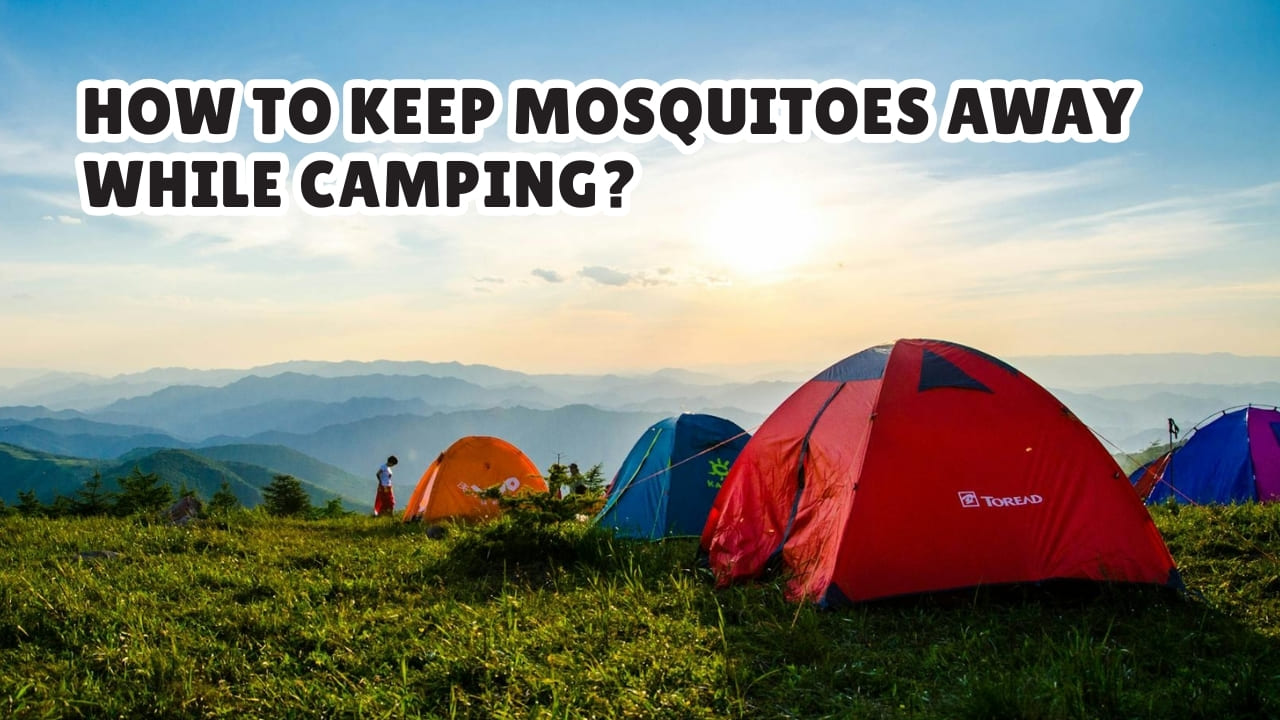Introduction
Some men and women consider it a pleasure to go out camping with their families, friends or even by themselves, others regard camping as a fun outdoor family activity and as a way to foster great memories. However, camping has some major disadvantages such as nasty mosquitoes that bite and suck blood from every part of your body. Regardless of the fact that their bombardment is more of an irritation, mosquitoes spread aggressive diseases like malaria, Zika virus and many more.
Thus, it is important that while you are relishing your escape time in the jungle, you have proper measures to ward off mosquitoes. The focus of this guide is on the areas of prevention that should be highlighted to avoid these nasty insects, and consequently be able to have a pleasant camping experience.
How to keep mosquitoes away while camping?
1. Picking Right Camping Spot
One of the very basic and crucial steps to keep mosquitoes at bay is to opt for a proper spot where you want to set up a camp, and that is to some extent away from the jungle or thick forest. Mosquitoes tend to breed and flourish in dense vegetation. Conversely, locales that contain vegetation, such trees, shrubs, and pasture provide cover for adults and places for female mosquitoes to breed thus promoting the prevalence of mosquitoes in general.
Additionally places like swamps, ponds and wetlands also tend to have larger amounts of mosquitoes because they are nourishment for those areas.
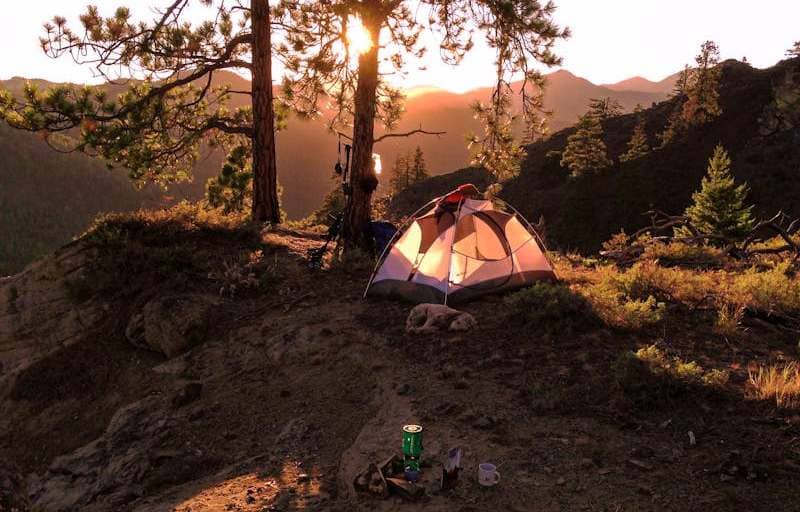
Image Credit: Pexels by Nathan Moore
Away from Water Bodies: There is not a single camping location that is completely safe from the bite of a mosquito. But there is a way to avoid them altogether by keeping in mind mosquitoes’ stagnant water breeding habit. Stay away from camping near lakes, marshes, and ponds as they are known to attract mosquitoes, though not in hordes. In fact, it is best to camp at least 60 meters away from any water reservoir. If you are looking to camp near a water body, then avoid lakes and marshes, settle instead where there are continuous flow of water as mosquitoes prefer stagnancy.
Sunny and Breezy Areas: Campsites are better off without mosquito hosts, and even if they are around, they should be unable to fly. Mosquitoes on their own would not be able to do that as they dislike windy areas, thus if your campsite is windy, there will be less number of mosquitoes.
For instance, choose a place that is relatively hot, dry, and has strong winds since mosquitoes usually dislike such areas since they are humid and shady. Natural breezes and masses of open land with no vegetation should be aimed for when trying to repel mosquitoes and make sure your campsite is sunny and breezy.
Check Surroundings: Since mosquitoes are known for their stealthy nature, they can use tall grasses and thick shrubs and other vegetation as hiding spots to evade their predators, and thus gain the upper hand in their fight against extinction. So when selecting a campsite, make sure to properly clear any debris or brush and surrounding areas so that mosquitoes have a minimum number of places to hide.
How to repel mosquitoes while camping?
2. Wear Protective Clothing
The amount of clothing you have on translates directly into the number of mosquitoes who are willing to come and bite you or who are looking forward to biting you.
Cover Your skin Properly: When it Comes to covering the skin part of the body which is why it is so critical to understand how to dress appropriately for the purpose of being bitten by mosquitoes. In such places where there is a rampant mosquito population, people should always ensure that they wear long pants and long sleeve shirts made of a light fabric so that their arms and legs are entirely covered, reducing the exposure.
Get Dressed in Light-Colored Clothing: It is believed that mosquitoes are attracted towards people who wear black or any dark clothing or clothes, which is why it is advisable to wear light colored clothes, where the hugs of mosquitoes will be biter few. It is also a pretty decent way to deflect the sun’s rays and help you feel comfortable.
Mosquito-Repellent Fabrics: There is also the option of buying clothes which have been treated for pest control measures like permethrin, that may be an option for some as well. Such types of clothing does allow you stay comfortable whilst at the same time providing yourself an extra barrier from the annoyance of mosquitoes.
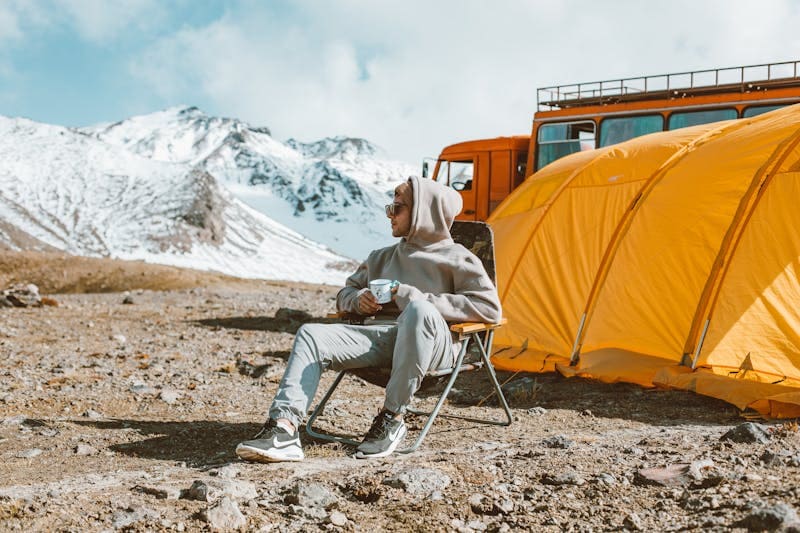
Image Credit: Pexels by ROMAN ODINTSOV
3. Apply Efficient Mosquito Repellents
Finally, I would suggest that fighting off mosquitoes starts with great prevention methods, and one easy approach is using mosquito repellent.
Chemical-Based Repellents: These are known to be some repellents but will require more than a single application for effectiveness as swimming or sweating will require it to be reapplied.
Natural Repellents: Alternatively, there are a few natural ways to repel mosquitoes: cooking with essential oils like lemon balm, eucalyptus, and lavender may do the trick. Look for natural repellents that include these kinds of oils or thin them out with carrier oils.
Application Tips: When heading outside, make sure to apply repellent on all exposed skin as well as on clothing. Moreover, wash up and remove clothes that are sweating or have been rubbed against something.
4. Construct Physical Barriers
The construction of physical barriers like mosquito nets and mosquito screens can provide a great mosquito control and prevention measure.
Hanging Mosquito Nets: Accompanying netting curtains can be an option for you to assist in ensuring that mosquitoes do not come too close to you.
Mosquito Nets: Hammocks or sleeping beds should always have mosquito nets attached to them so that when a person sleeps, he doesn’t get bitten. Make sure to fix the nets up completely and avoid letting them have the slightest chance of a hole to come inside through.
Tent Screens: When erecting the tent, see to it that all the ventilators/doors are fitted with screens of fine meshes. That way, the mosquitoes will be kept out, and at the same time, fresh air is permitted to the inside of the tent.
Canopies with Nets: If you are at a campsite, you can fix up canopies over the places where you have dining or relax. This way, it provides you with a mosquito free area, so even when eating or chatting, the mosquitoes won’t bother you.
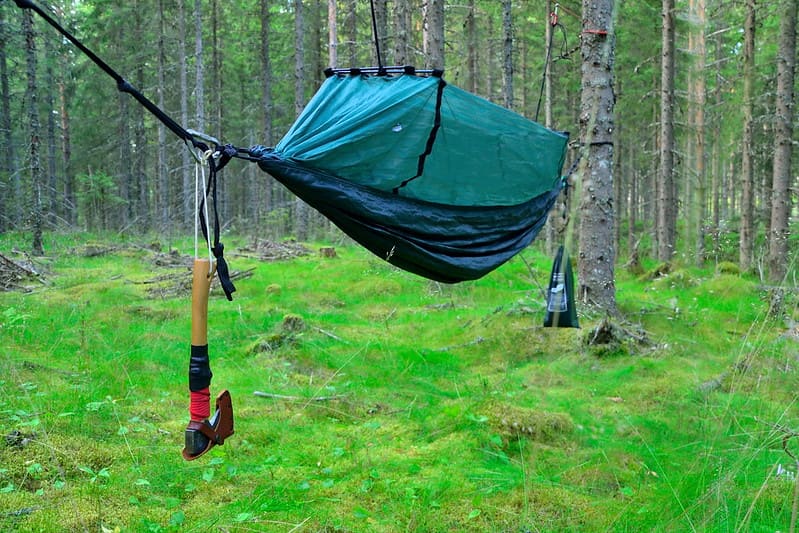
Image Credit: Pexels by Rohan Sudan
5. Use Campfire and Smoke
You’ve made the bonfire and ready to lounge. To your surprise, this will actually help get rid of the insects – especially mosquitoes.
Herbs that Repel Mosquitoes: Sage, rosemary and oregano are some herbs that don’t just repel but also have a pleasant smell. Mosquitoes also tend to get annoyed while hovering when there’s such irritant.
Utilize Citronella Candles: The usage of citronella candles can help further prevent mosquitoes when placed around the campsites. At nighttime, these candles can also create a nice ambiance during the gathering to talk and create great memories.
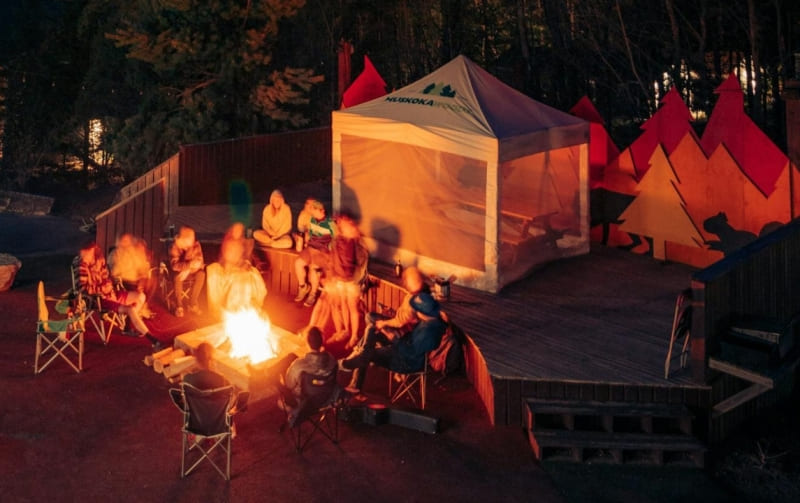
Image Credit: Pexels by David Gari
6. Properly Operate Lighting Systems When It’s Nighttime.
Mosquito activity is said to be influenced by the type of lighting present at the campsite.
Reduce Lighting with Dim or Yellow Colors: Mosquitoes are persuaded to come around white bright lights, therefore using yellow LED or any other dimmed lights instead can reduce possibility of their presence around the campsite. Compared to white bulbs, yellow bulbs are a less common choice because they generally repel insects.
Avoid Setting Up Lights in Common Areas: Lights should be placed far from the areas that are used most for sleeping or for sitting together. While indoors, lights can be used as guide but should not be used for visibility purposes.
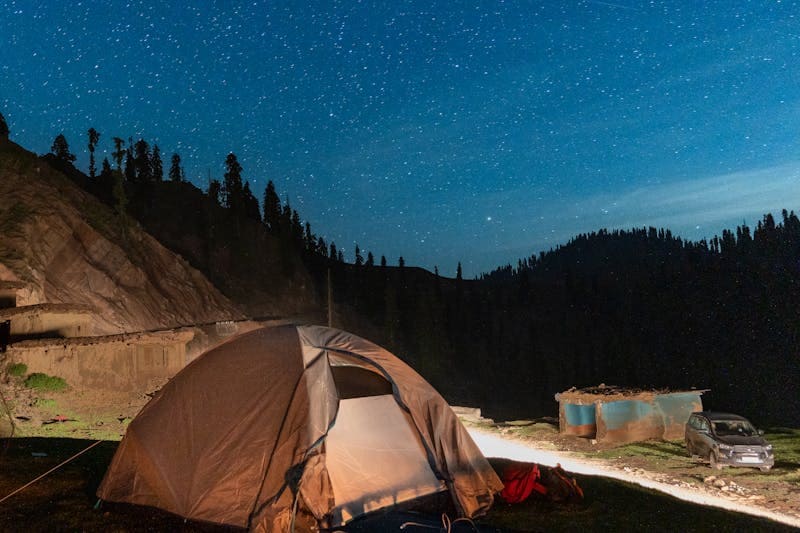
Image Credit: Flickr by Jason Jones
7. Try to Clean Up Around the Campsite as Much as you Can.
It is extremely essential to maintain the cleanliness of the campsite in an effort to minimize the amount of attention the mosquitoes pay to it.
Store Food Properly and Dispose Off Leftovers: Keep food leftovers in polythene bags and sealed containers, ideally. Otherwise, any leftovers will not only attract mosquitoes but many more animals.
Get Rid of any Stagnant Water: This includes removing any containers that can capture rainfall or dew including tarps, coolers or similar items. As a matter of routine you must also look about you and your camp for any water that has settled and drain any such water on a regular basis.

Image Credit: Pexels by Thirdman
8. Set Mosquito Traps or Zappers
Setting traps can be one of the methods to control the number of mosquitoes on your campsite.
Portable Traps: In the case of camping consider the other alternatives of portable mosquito traps which include electric or chemical traps. These devices are very effective as they use a technique in which they attract the mosquitoes towards themselves and capture them.
DIY Homemade Traps: Trying out simple homemade traps with sugar and plastic bottles works out well. Take a bottle, cut it into half, fill it with sugar water and yeast which produces carbon dioxide. Invert the upper half of the bottle in the lower half and keep it away from your main area to lure the mosquitoes away from the campers’ location.
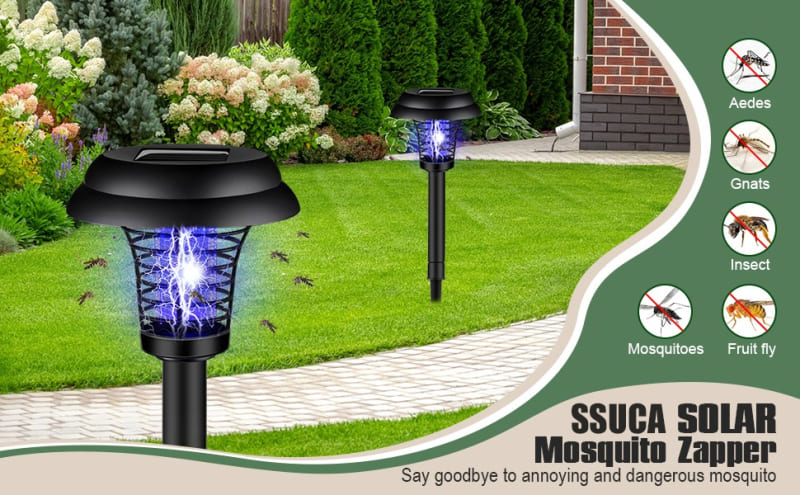
9. Repel Mosquitos with Barriers in the Form of Natural Deterrents
Mosquitoes, like other insects, can be repelled through the application of natural resources that are readily available to you.
Mosquito Repellent Plants: The strong odor of basil, marigold or citronella plants will also repel mosquitoes and therefore planting those at the vicinity will help.
Garlic and Onion Sprays: To keep mosquitoes away from your tents, try scattering sliced or powdered onions and garlic around the camp border, because the pungent scent drives the pests away.
10. Plan Timing of Activities
One of the ways to avoid maximum exposure to mosquitoes is planning your outdoor activities intelligently.
Avoid Dusk and Dawn: Mosquitoes are most ferocious attackers at dawn and at dusk. Slight elevation in temperatures cause an elevation in the humidity around the two times, giving rise to the mosquitoes. Outdoor activities can be planned during the afternoon when they are least active due to higher temperature and sunlight.
11. Additional Tips
There are some warming tips for mosquito avoidance strategies in addition to the strategies mentioned above.
- Carry Antihistamines and Anti-Itch Creams: Despite the precautions taken during outdoor activities, it is still a good chance that you will be exposed to mosquito bites, therefore having medical supplies such as antihistamines, anti-itch creams, or anything similar can be extremely useful in soothing the skin and easing the allergy caused by the mosquito bite.
- Educate Your Group: Make sure these tips are shared with every single member in your camping group so that the group members can also take the required measures to avoid mosquito bites.
- Consider Using Fans: If electricity is available in the camping site, placing high speed fans would reduce the chance of mosquitoes coming close to you as the movement of air makes it more difficult for mosquitoes to fly around you.
Best portable mosquito traps for camping
Top Portable Mosquito Traps for Camping
Mosquitoes always seem to attack campers out of nowhere which ruins the experience. Fortunately portable mosquito traps exist which address similar issues so that the campers do not have to deal with any annoyance during camping. So here are some of the traps which can be carried easily for camping along with their features and benefits.
1. DynaTrap 1-Acre Mosquito and Insect Trap
Overview: One of the most effective selection for controlling the DynaTrap mosquito species is its easily useable design.
- Area Coverage: One acre of land.
- Working: Attracting mosquitoes with the help of UV light, heat and carbon dioxide.
- Features:
- Quiet and imagine no noise.
- Comes with a base that can be easily removed for cleaning.
- Strong construction.
Advantages:
- Without using sounds that zap, it is effective to use.
- Only requiring the power cord to be connected for set up.
Disadvantages:
- Would be ineffective for camouflaging given the need for a charger but would work well with the portable charger.
2. Wisely Rechargeable Camping Zapper With Lantern
Overview: Ideal for camping as it combines a zapper with a lantern to transform into a durable portable item which is great for camping.
- Weight: Easy to carry and use.
- Battery Duration: Capable of use for up to 20 hours.
- Features:
- Mesh safety grid to avoid accidental contact while operating silently.
- UV light is very useful in attracting mosquitoes.
Pros:
- It can be used both as a light and a mosquito trap.
- Convenient to charge because it’s easy to carry.
Cons:
- Smaller traps do not have as much coverage area compared to larger ones.
3. Thermacell E90 Rechargeable Mosquito Repellent – Battery-powered, Children Friendly
Overview: You’re going to love the Thermacell E90 because, unless you would like to smear some bug repellent lotion on yourself, this is an extremely effective device.
- Battery Life: Can be used for close to 9 hours once charged.
- Operation: Feasible! Creates a 15-foot zone of protection through the utilization of repellent mats that emit allethrin.
Pros:
- Silent operation with no odor makes it less intrusive to use.
- Ideal size that fits within a rucksack described as easy to carry.
Cons:
- Regular replenishing of Mats may require additional expenditure from time to time.
4. Thermacell MR450 Mosquito Repellent – Highly Recommended for Trekking
Overview: This is highly effective mosquito protection to be used by people who are planning for long camping trips.
- Fuel Source: Make use of cartridges containing butane gas.
- Operation Time: Almost 12 hours of use on the cartridge before it has to be replaced.
Pros:
- Rugged construction will withstand the outdoor environment.
- Capable of providing protection over a wide area from mosquitoes.
Cons:
- Not as efficient as rechargeable ones as it requires cartridges to be replaced.
5. Tysonir Electric Bug Zapper
Overview: A lightweight bug zapper which makes it easy to hang on the trees in the campsites.
- Weight: 2 Pounds.
- Waterproof Design: Easy to maintains and clean.
Pros:
- Zapper is highly portable and can be hung anywhere.
- Very good at capturing and killing mosquitos within a very short time.
Cons:
- Due to the limited coverage area of the zapper, more units would be required to be placed at larger campsites.
6. Stansport Camping Lantern Bug Zapper
Overview: The lantern has a very valuable asset in the form of being an insect trap along with providing light.
- Weight & Size: This has a compact and light weight structure.
Pros:
- A good placement zapper provides atmospheric illumination while killing bugs.
- Very simple in its operation; simply place/ hang it in your camping site.
Cons:
- One of the downsides is that in areas that are large and wide open, the net may fail and it’s effectiveness wouldn’t be as high as other insect trapping devices.
Your camping experience would be enhanced to a whole new level by getting portable traps that would deal with nuisances like mosquitoes. People nowadays can choose from a lot of products such as electric zapper devices, rechargeable devices, or even lanterns, all which serve different purposes while making camping easier. This consistently makes the experience more homely while also providing protection from mosquito bites.
Best way to keep mosquitoes away while camping
To repel mosquitoes when camping, one of the best way that I know is using a Thermacell device. Thermacell offers a concept which is very ingenious and works effectively by preventing mosquitoes from coming into contact with the people that it protects by releasing allethrin, a man-made insect repellent.
Key Benefits of Using Thermacell:
- Complete Protection: It makes an area of more or less 15 foot diameter free of mosquitoes.
- Convenience: Just switch it on and it operates of its own after a few minutes without the time-consuming practice of applying it again and again like the sprays do.
- No Need to Apply on Skin Directly: That removes the tacky and possibly the irritating feeling of applying the topical repellents.
- Enjoyable for Social Events: Thermacell is designed without noxious smelling sprays and candles, which makes social events effortless.
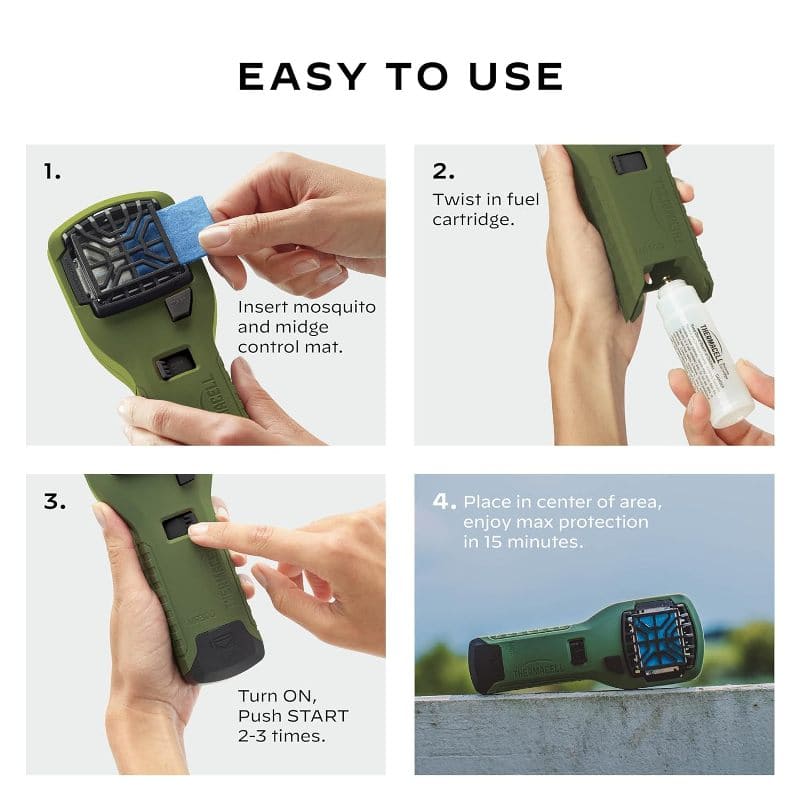
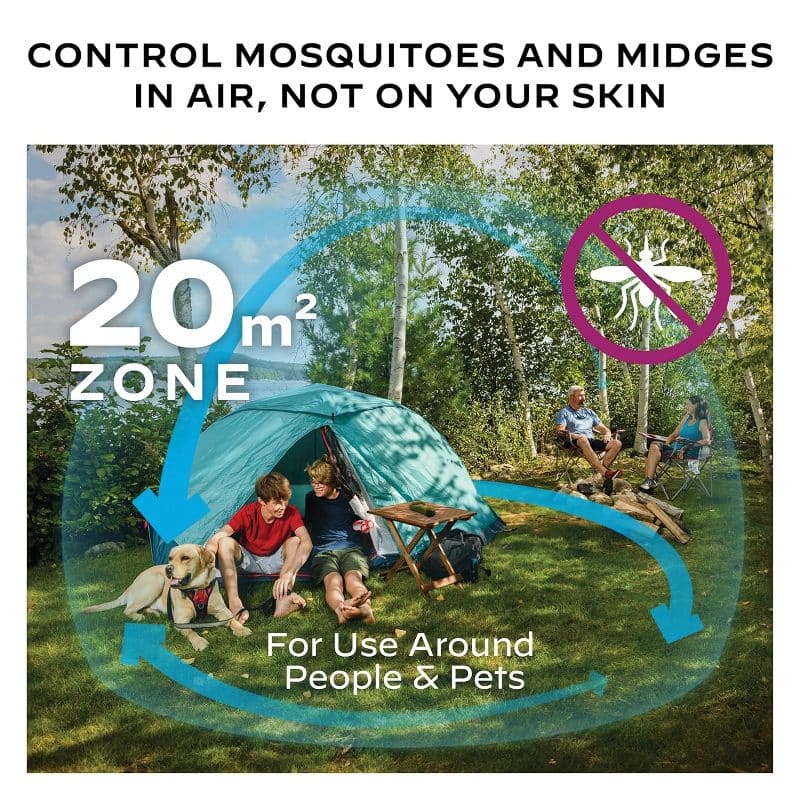
Although it would be necessary to take into account wind conditions and the like, many campers consider Thermacell as one of the best solutions for protection from mosquitoes during summer activities outside.
📰 Must Read,
✔️ How to Keep Mosquitoes Out of Your Tent While Camping
✔️ How to Make Citronella Candles for Repelling Bugs and Mosquitoes?
Conclusion – Get rid of mosquitoes while camping
After all, while a camping trip can either be a wonderful encounter or a good time away from busy work routines, it is still important to take measures that would handle mosquitoes! Selecting the site properly, dressing appropriately, applying good repellents, constructing physical barriers, controlling the lighting, cleaning the area at your site, using mosquitoes traps or zappers, applying natural repellents, considering the activities, and also taking extra’s with oneself— this is how a camper can help themselves from being disturbed by the insects.
Following such measures also enables campers to focus on escaping the worries of being mosquitoes bitten, and instead they can just absorb what this beautiful nature has to offer and enjoy great moments of their lives without even getting worried about the diseases that these insects may carry.
Frequently Asked Questions (FAQs)
-
How long do portable mosquito traps typically last on a single charge?
Battery-operated mosquito traps can last several hours to a couple of days which is a normal case for such models. Some like the rechargeable mosquito bats can work for multiple days with moderate usage while some models of batteries tend to die out within a mere few hours. Powerful batteries and multiple charging units may allow such traps to extend their time of operation. This explains the design identity of portable battery operated zappers as they don’t need a plug to zap mosquitoes instead running on battery.
-
Are there any mosquito traps that don’t require electricity?
Indeed there are mosquito traps that do not use electricity. Other portable models that are battery operated zappers or that use butane cartridges provide good relief from mosquitoes without the need of an electrical outlet. Such devices are ideal for camping or outdoor activities when power supply is limited or lacking.
-
Can mosquito traps be used indoors as well as outdoors?
Mosquito traps can certainly be used both inside as well as outside the buildings. There are many electric zappers and UV light traps that can serve both purposes hence can control the proliferation of mosquitoes in targeted areas. When using such devices indoors, it is important to pay careful attention to ventilation to ensure safety and comfort.
-
What safety features should I look for in a mosquito trap?
Considerations such as the ability to keep users from coming into contact with the electrified sections of the gadget, failure-resistant shut-off measures that will prevent the uneconomic overheating, and harmless lures or traps that don’t cause the same hazards to the health of people and pets need to be incorporated into the design of the Mosquito traps. Moreover, such models may be considered which are designed for outdoor use especially the ones used in places with good ventilation so that gases caused by combustible traps do not accumulate.
-
Are there any mosquito traps that work without UV light?
Yes, there are mosquito traps that work without the use of UV light. Quite a number of traps use other means like, chemical lures, the use of heat, or the emission of carbon dioxide as attractants to mosquitoes. For instance, mosquito traps that burn propane provide carbon dioxide without the use of uv light. These types of traps can be greatly effective in places where there is no electricity such as outdoors.
-
How do mosquito nets differ from tent screens in terms of effectiveness?
Mosquito nets provide more coverage than tent screens – how so? Mosquito nets are still composed of thin mesh materials, that are carefully designed to encase sleeping quarters giving them an advantage over tent screens that do not have such mesh, however when properly secured both serve as adequate protection.
On the other hand, tent screens come with some disadvantages as well such as the fact that they are only meant for ventilation and are not secure and as a result they allow some mosquitoes to penetrate which diminishes the purpose of the tent screen. To sum up, what has been established above is that, both mesh and tent screens provide some level of protection, however mosquito nets are always more efficient when supported by supreme structures.
-
How do mosquito traps with fans work compared to those without?
Traps equipped with a fan work through suction which pulls in mosquitoes into a catchment area where they are either killed or kept. The fans are strong enough to entice the mosquitoes, which are said to be inquisitive insects that go after moving air. On the other hand, traps without fans have to rely on passive means and lay sticky surfaces or use chemicals to attract work suppressed mosquitoes.
Though trapping with the aid of fans has been established to catch a lager number of mosquitoes due to active approaches fanning, the non-fan traps may be simpler and quieter but usually capture less mosquitoes in areas with high concentrations of them. Mosquitoes are a nuisance in any case but their areas of high concentration can be quite troublesome for effective traps to work under.
-
What are the benefits of using a wristband or clip-on mosquito repellent?
Mosquito bands or clip-ons have some advantages that users wishing to avoid mosquito bites would find more effective in rate of usage. These devices simply repel mosquitoes through the release of scent by essential oils or even chemical repellents, hence being useful outdoors without the use of hands. They are also light and easy to wear or attach without having to use sprays and lotions that are sticky or cumbersome to apply.
In the same way wristbands and clip-ons enable the protection against mosquitoes during the day while being gentle on sensitive skin, or for those who don’t want to use skin applied mosquito repellents as they allow 24hrs of use without needing to apply them regularly.

